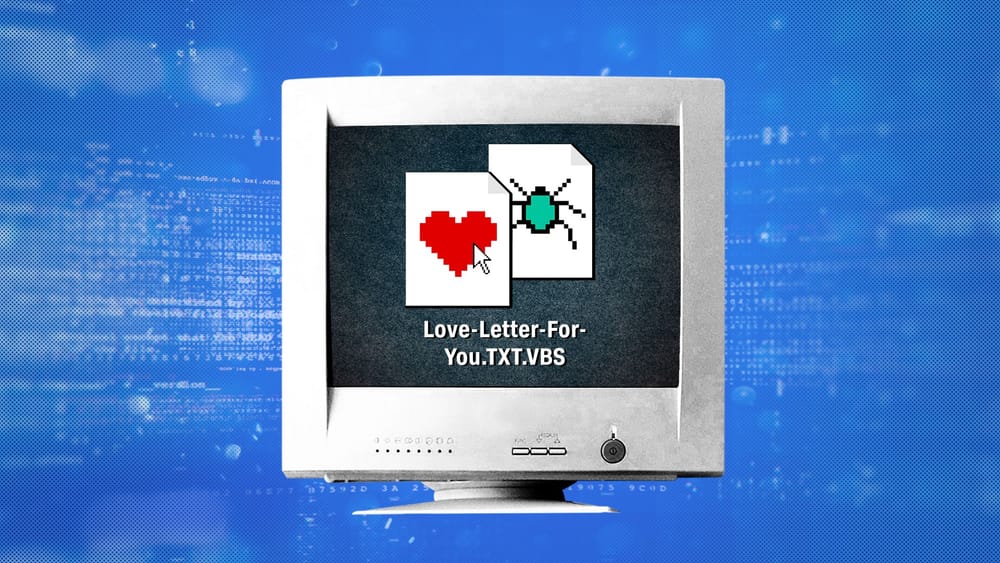The "I LOVE YOU" virus origin ?
In the early 2000s, a malicious computer virus known as the "I Love You" virus caused widespread havoc across the internet. Also known as the "Love Bug" or "LoveLetter," this virus originated in the Philippines and quickly spread around the world, affecting millions of computers and causing an estimated $10 billion in damages.
How It Worked
The "I Love You" virus was a type of worm, which is a self-replicating program that spreads by copying itself. It arrived as an email attachment with the subject line "ILOVEYOU" and an enticing message that simply read "kindly check the attached LOVELETTER coming from me." When recipients opened the attachment, a Visual Basic script (VBS) executed, initiating the infection process.
Once activated, the virus would:
- Replicate and Spread: The virus would send itself to everyone in the victim's Microsoft Outlook address book, ensuring rapid and widespread dissemination.
- Overwrite Files: It would overwrite various types of files, including images, audio files, and documents, replacing them with copies of the virus script. This resulted in significant data loss for many users.
- Steal Passwords: The virus included a mechanism to steal passwords and other sensitive information from infected systems.
The Origin Story
In May 2000, a young hacker in the Philippines named Onel de Guzman created the ILOVEYOU virus. De Guzman had recently dropped out of college after his professors rejected his undergraduate thesis on using malware to steal internet passwords, deeming it unethical and illegal. He believed internet access was a human right and sought to provide it to everyone. After leaving school, he removed restrictions on the malware and sent it to a contact in Singapore, resulting in a global infection. Within 24 hours, the virus had infected around 45 million Windows computers and ultimately affected about 10% of the world's internet-connected computers, causing billions of dollars in damages and sparking international investigations.
The Impact
The rapid spread of the "I Love You" virus overwhelmed email servers and disrupted businesses, government agencies, and individual users. Some notable impacts included:
- Global Reach: The virus infected tens of millions of computers worldwide within hours of its release.
- Economic Damage: The cost of recovery, data loss, and the implementation of new security measures was estimated to be around $10 billion.
- Social Engineering Tactic: The virus exploited human curiosity and emotions with the "love letter" theme, making it more likely for users to open the attachment.
- Awareness and Security Improvements: The outbreak underscored the importance of robust cybersecurity practices, leading to increased awareness and improvements in email security and antivirus software.
Lessons Learned
The "I Love You" virus highlighted several key lessons in cybersecurity:
- Be Cautious with Email Attachments: Never open email attachments from unknown senders or unexpected emails, even if they appear to come from a known contact.
- Regular Updates and Patches: Keeping operating systems and software up to date with the latest security patches can help prevent exploitation by malware.
- Use Antivirus Software: Reliable antivirus programs can detect and neutralize threats before they cause damage.
- Backup Data: Regularly backing up important data ensures that you can recover files in case of a malware attack.
Conclusion
The "I Love You" virus serves as a stark reminder of the potential dangers lurking in our digital communications. By adopting cautious and proactive cybersecurity measures, we can protect ourselves from similar threats in the future. In an era where cyber threats continue to evolve, staying informed and vigilant remains crucial to safeguarding our digital lives.




